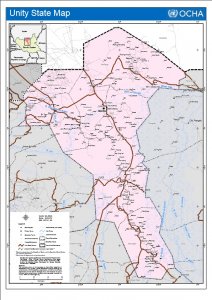-
Capital: Bentiu
-
Approximate Population: 585,801
- Internally Displaced People (IDP) sheltering in the state: 265,500
While parts of South Sudan have been relatively calm in July, Unity State is still severely insecure. In the last two weeks the agreement on cessation of hostilities has been violated by clashes between the SPLA and the SPLA-in-Opposition (SPLAiO) in Kuergueyni, Guit, Nhialdiu and Wichok.
Unity State is situated on the west side of the White Nile and borders the Sudanese state of South Kordofan to the North. The current civil war reached Unity State on 19 December 2013 when Major General James Koang Chuol defected to the opposition, and two days later he declared himself Governor. The subsequent fighting in different military barracks also affected civilians as the military quarters hosted soldiers’ families and other civilians.
Because of its oil reserves and production facilities, Unity is strategically important to the warring parties and the compound of the Greater Pioneer Operation Company (GPOC) was attacked during the first day of the conflict. Oil revenues are essential for keeping the South Sudanese government afloat and any long-term shut-down of production would have grave consequences for the future of the country. In the extension of the UNMISS mandate 27 May, oil installations were identified to be in need of special protection. As a result, UNMISS has been criticised for prioritising international companies’ oil assets over South Sudanese civilians. However, UNMISS maintains that their purpose is to protect the workers and their families in the oilfields.
SPLAiO seized the state capital, Bentiu 20-21 December, but SPLA recaptured the city in January. With the capital under their control, the SPLA moved south and fought the rebels in Koch, Leer and Panyijar counties. The battle over Leer, Riek Machar’s home county, was particularly devastating; Leer’s hospital was destroyed and 40,000 civilians who were seeking refuge in the city were again forced to flee. In the west, the warring parties laid waste to Mayom county. The Cessation of Hostilities Agreement, signed in late January, did little to stop the civil war. In April Bentiu was destroyed after it again was seized by SPLAiO. Hate speech was broadcasted on the radio and many civilians were killed, including more than 200 Darfurian civilians, sheltered in a mosque. The UN called this massacre a “game-changer”. In May, SPLA again took control over Bentiu and the state capital has been in government hands since then.
Unity State’s proximity to Sudan and the various armed groups on both sides of the border further complicate the situation. Parts of the Sudanese opposition group Justice and Equality Movement (JEM) sided with the SPLA in December 2013, but has denied any participation in violence in 2014. Moreover, JEM blamed the Government of Sudan (GoS) for the killing of Darfurians in Bentiu. Meanwhile the Government of South Sudan has accused Sudan government forces of assisting the SPLAiO. Tensions between the two countries increased further when Sudan in April dropped bombs outside Neem village close to Yida refugee camp in Pariang county.
There are more than 80,000 Sudanese refugees in Unity State who has fled from the civil war in South Kordofan and the UNMISS Protection of Civilian site (PoC) in Bentiu, the largest in South Sudan, shelters 40,574 people. UNMISS is concerned over the squalid conditions in the camp. Despite the fact that about 150 people move to Sudan every day, the camp still lacks capacity to accommodate the daily intake of displaced people. UNMISS is planning a new Bentiu site, but as the rainy season makes transport and supply provision difficult, it is uncertain when it will be finished.

Leave a Reply